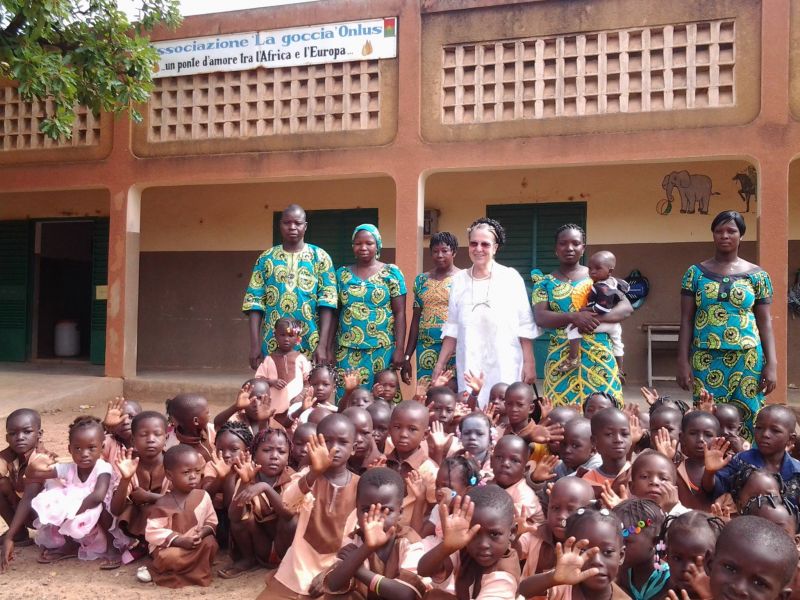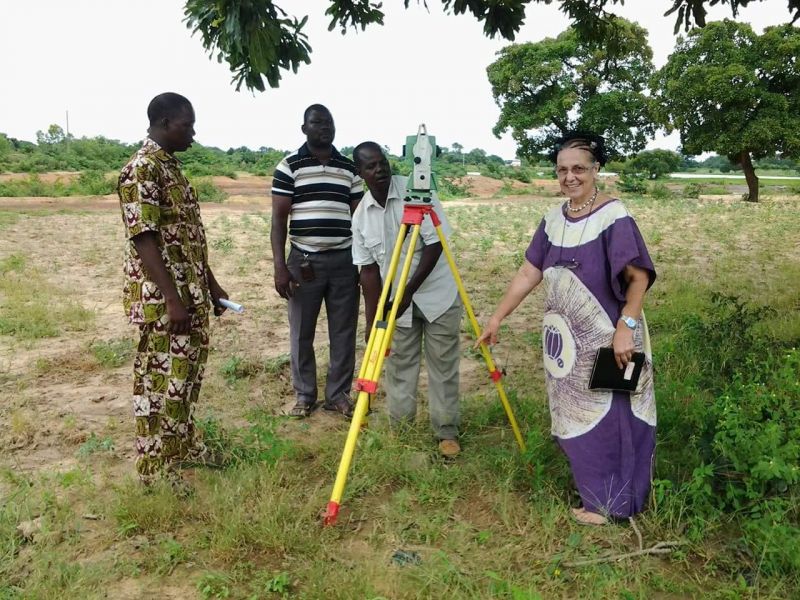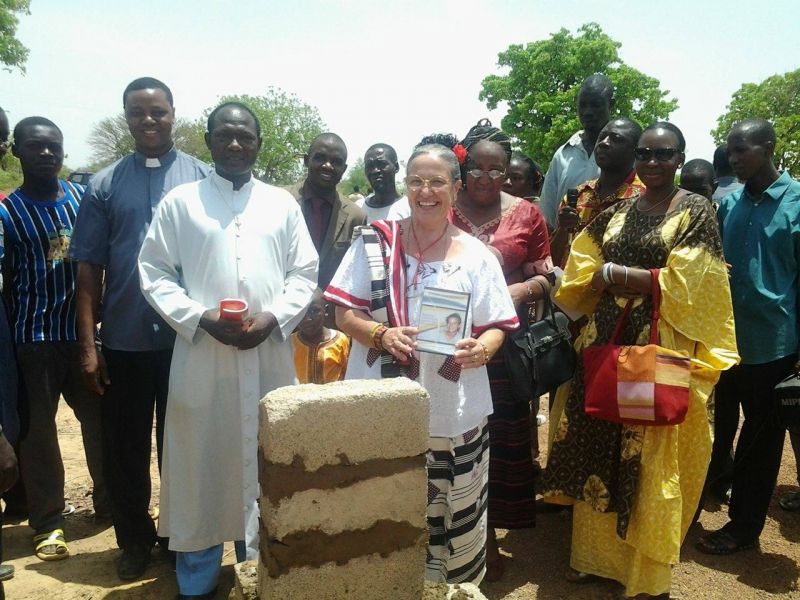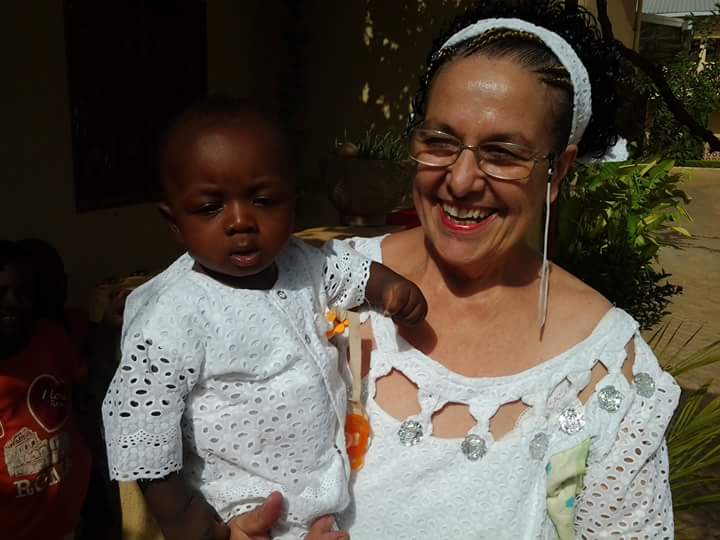
Workshop
Paola, the great-grandmother from Rome who builds wells and schools in Burkina Faso

New frontiers for a new humanity.” This is how the Italian journalist Franco di Mare entitled his interview to Paola Garbini Siani, founder and volunteer of the Association “La Goccia Onlus” during an information program on the Italian National Public TV Broadcaster, RaiUnoMattina.
I watched the live broadcast on January 4 at the request of Paola herself, who considered my “presence at a distance” as an encouragement, as if the fact of knowing that her friends were watching the program made it easier for her to share her Africa.
“In 2002, I made my first trip to Burkina Faso. I got there almost by chance, together with the Camillian women religious, to bring a statue of Our Lady to a sewing school we were setting up. That evening, after celebrating for this gift, I could not get asleep. I was wondering: what did I come to Africa for? Just to bring a statue of Our Lady? But what should this people do with a ceramic statuette, with all this poverty? I kept crying all night long, and at dawn I turned this question to Our Lady. At a given moment, I perceived her answer: you can be my arms, my heart“.
This is the beginning of Paola’s adventure in Burkina Faso, the “country of upright people”, according to the etymology of the name in the languages More and Bambara. While listening to the live broadcast, I realized that a five-minute interview was not sufficient to tell her story, her daily struggle against desertification and school dropout.
Paola was a nurse, she worked in the surgical operating rooms of the Vannini Hospital, in Via dell’Acqua Bullicante, in the outskirts of Rome. She was the nurse of terrified patients, the one who was called in emergencies, because she knew how to perform the “pre-anaesthesia,” as her colleagues jokingly used to say. She was so good in listening to the patients who were frightened, lonely, and pained, that after a while they always calmed down, and this made much easier the work of the real anaesthesiologist. Paola had (and still has) a large and beautiful family: she is mother of three children, grandmother of four grandchildren, and great-grandmother of two great-grandchildren. In the framework of this normalcy, based on that 2002 experience, she founded the Association “La Goccia Onlus” (The Drop, non-profit association for socially usuful purposes), whose slogan reads: water is life, education is vital. From that day on, the excavated wells and the fully completed works became countless.

In September 2007, the first nursery school was inaugurated in the village of Mogdedo. It was called “Sainte Giselle,” because they dedicated the school to Giselle, a young girl who came in Italy a year after her heart surgery for a check up but she died the very evening of her arrival. While looking at her in her little coffin, Paola had the inspiration to dedicate the school to her. In that institute, 120 children aged 3 to 6 had the opportunity to receive an education, a place where they can play, a daily meal, and good teachers who take care of them and their training at their best.
Paola has been commuting with Africa until 2009. That year, Oreste, her beloved husband, suddenly died. She wanted his death to leave deep meaning to her life, and she understood that she was to devote herself entirely to Africa. She moved to Burkina Faso, which became her second home.
In the same year, after a tremendous flood in the diocese of Koupela, she was contacted by the local bishop, who asked for her help to rebuild the elementary school of the Catholic mission, which was completely destroyed. Although she did not have the means, Paola made an act of trust and bound herself to this action, for those children to see their right to education respected, like all the children of the world. Today the new school complex receives more than three hundred students.

Then, following her encounter with Denis, a deaf child she picked up on the street, who really wanted to attend school, she faced another challenge: to create a center for the education of children with hearing loss. In this completely new work for the Association, she involved the priests of the parish church where she had spent her childhood, the Sons of Mary Immaculate (Pavonians), who bring the charism of St. Ludovico Pavoni into the world. This saint was particularly close to the deaf in his life; he wanted to give them the opportunity to integrate into society by means of a good education and a profession. This is how the “Effata” Center was founded.
While living in Bourkina Faso, Paola was also deeply affected by the tragedy of very young unmarried mothers and by the lack of schooling for girls, who are already disadvantaged in their own family, in comparison to their brothers. She saw with her own eyes the devastating consequences of these problems, both on an individual and social level: lack of literacy, exploitation, health risks, high rate of maternal mortality… This is why, in the Municipality of Baskouré, a women’s training center was opened, named after Blessed Chiara Luce Badano, with the aim of improving the living conditions of young women through school and vocational education.
“We are now in 2018, which means that I’ve been volunteering for fifteen years …” Smiling from the TV screen, with her broad, slightly tanned face, not wrinkled at all, in spite of her seventies, Paola is about to explain to her inverviewer the profound reasons for her life given to Africa.
“The drive to do all this came to me from the ideal of the united world. In 1968, I met Chiara Lubich, the founder of the Focolare Movement. She gave me a strong push to put me out of home: to share, share, and share again. Because sharing is the only way that leads to a united world, to universal brotherhood, and we all aspire to it. We all want a better world for our children and our grandchildren. But if we remain comfortably seated in the living room of our beautiful home, how can we possibly change this world? So, I decided to go there, to put myself out, and share.”

After she had been working in Africa for fifteen years, the civil authorities of Burkina Faso have recognized the importance of her work and, in 2017, they conferred the Burkinian citizenship to her.
Lately, great-grandmother Paola has become a mother again. In December 2014, she welcomed a thirty-three days old boy whose young mother died eight days after giving birth to him. His name is Aziz Noel François Yougbare, and he is now three years old. The encounter with him became an opportunity to open up to another project: the construction of a special orphanage, to give hospitality, along with the children, also women without who remained on their own, so that, like grandmothers, they convey the African culture to the children without a family.
«I look at him, I see him growing, and I still hope I can watch him growing for a few years, but his presence here, next to me, is a precious gift that God wanted to make to me: today I feel this as the return of all the love that I brought to this earth. Africa gave me one of its sons as a gift.»
My opinion is that Paola’s experience teaches us that the ideal of the united world can truly be experienced at any age.



